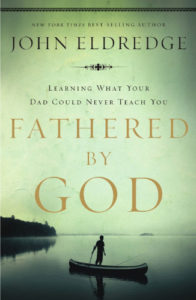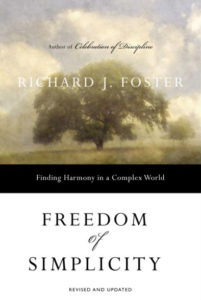
Fathered by God builds upon the premise of John Eldrege’s previous books, Wild At Heart and The Sacred Romance, that there is a lack of true manhood in the world and that manhood is more than just engine grease and NFL highlights. In Fathered by God, John suggests that we have neglected one of the most essential processes in becoming a man, namely, the initiation.
The initiation of men is culturally lost in America, but has historically been one of the quintessential factors in developing young men. Initiation is the bestowment of manhood from the “kings and sages” that have earned it, to the young “cowboys and warriors” that seek it. Fathered by God offers suggestions and examples for fathers who want to lead their boys into manhood, and hope for men of any age that hope is not lost, should their own initiation have been neglected.
One of the aspects I appreciated most about Fathered by God is the clear roadmap offered by Eldredge, guiding the way from boyhood to sage; from childhood to venerability. In his typical style, beautiful imagery, stories and movie scenes are used to evoke passionate displays of these progressive stages of manhood:
- Boyhood
- Coyboy
- Warrior
- Lover
- King
- Sage
Fathered by God through boyhood
Eldredge paints beautiful scenes of playful boyhood: tree climbing, endless imagination and backyard running — you know, the stuff The Sandlot and The Neverending Story were made of. Kids loving life and going on adventures, even just in their imaginations.
It’s also in boyhood that most men receive their first wounding. Either from an absent or abusive father, a controlling mother, the rejection of friends or sexual abuse… the list goes on. This tender stage leaves children vulnerable to pain and lies received from the world around them. For us to grow into healthy men, it’s important to understand this and to acknowledge where we may be wounded and need healing.
Fathered by God as a Cowboy
The “Cowboy” is the stage entered around 8 years old, weilding pretend guns, going on exploratory adventures, showing off strength and intellectual prowess. Sadly, this wonderful and healthy stage becomes the ultimate demise for some, as many men grow old but never leave “the Cowboy”.
It’s part of the development of a man, but we weren’t meant to stay here forever. In almost ever case, it takes a true man to call out the cowboy and invite him to continue his journey of manhood.
Fathered by God as the Warrior
Once a man realizes that his ultimate joy in life isn’t to showboat on his horse all day, but a deeper joy comes from fighting for something, someone or some cause. To have passion and put it on the line for another, is one of the greatest shows of love. Our selfless sacrifice is a reflective characteristic of God Himself, who put His own life on the cross for our sakes.
Jesus Christ is the ultimate warrior, and machismo and violent acts of earthly warriors, who only look out for their personal good, is just a lousy counterfeit of the real thing. Jesus’ perfect self-sacrificing love for us.
Fathered by God into a Lover
The warrior never really leaves a man, but it also shouldn’t dominate him. There is another aspect of manhood that runs in tandem with the warrior. That is, “the lover”. Together, the lover and warrior prepare a man for kingship, and it seems to me that he lover may be the first step towards the eventual stage of manhood, which Eldridge calls “the sage”.
As the lover is cultivated within a man, qualities such as gentleness, thoughtfulness and romance emerge. Enjoyment of poetry, the beauty of nature and adoring respect for God’s inherent fingerprint on women, become a part of a young man’s thoughts and behavior. A man grows in depth and richness as the lover inside of him comes alive.
The lover, though romantic, isn’t necessarily sexual in nature. That would be far too limiting. He is more than that. He is breathing in the fullness of life and, with it, reflecting God’s nature as creator and enjoyer of excessive and unrelenting beauty.
Fathered by God in Kingship
Men were made to be Kings. When a man rules well, he brings glory to God by pointing back to the ultimate King as a son who was made in his Father’s image.
Then God blessed them and said, “Be fruitful and multiply. Fill the earth and govern it. Reign over the fish in the sea, the birds in the sky, and all the animals that scurry along the ground.” Genesis 1:28 NLT
We were created to reveal God to men, by sharing in the responsibility and honor of governing and reigning well over creation. God partially relinquishes his dominion so that we may join him in the role of lordship.
It is the glory of God to conceal a matter; to search out a matter is the glory of kings. Proverbs 25:2 NIV</cite
Kings are meant to explore, expand, inquire and conquer. We search out mysterious, because in the discovery, God is revealed and glorified, often for the greater benefit of the people.
Now if we are children, then we are heirs–heirs of God and co-heirs with Christ, if indeed we share in his sufferings in order that we may also share in his glory. Romans 8:17 NIV
We as Kings and heirs to rule and reign with Christ, invited to share in both His glory and His suffering. Proper Kingship is not about sitting on a throne and being served; it’s actually about getting off the throne and serving those who are under your authority. The misunderstanding of kingship and authority is what makes so many women cringe at the thought of a husband being “the head of the household”.
When the godly are in authority, the people rejoice. But when the wicked are in power, they groan. Proverbs 29:2 NLT
Men, are your wife and children rejoicing or groaning under your leadership?
Fathered by God as a Sage
The last stage of manhood in Fathered by God is “the sage”. Many men never arrive here, because they never graduate from the previous levels.
The Sage is one who has been a cowboy, warrior, lover and king. He has fought well and has something to offer. His effort and diligence has earned him something more valuable than gold or silver: wisdom.
Our society has been negligent to bestow honor the elders in our communities who have gone before and cleared the way for us. These men have seen battlefields, lost loved ones, provided for their families and loved their wives well. They have sought God, wrestled with Him and now “walk with a limp” because God has left His mark on them. In humility and with perspective, these sages offer years of experience and prevent incalculable amounts of pain and suffering for those who heed their advice.
Conclusion
I was really blessed by Fathered by God. It falls right in line with our work, training Christian leaders at Revolution5, and I believe this book would be incredibly valuable for both sons and fathers to read, as each will benefit from it, regardless of which stage they find themselves in.
Thanks Mr. Eldridge, for continuing the passionate pursuit of discipling young men into the image of Christ.




